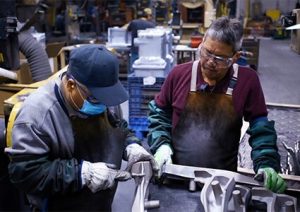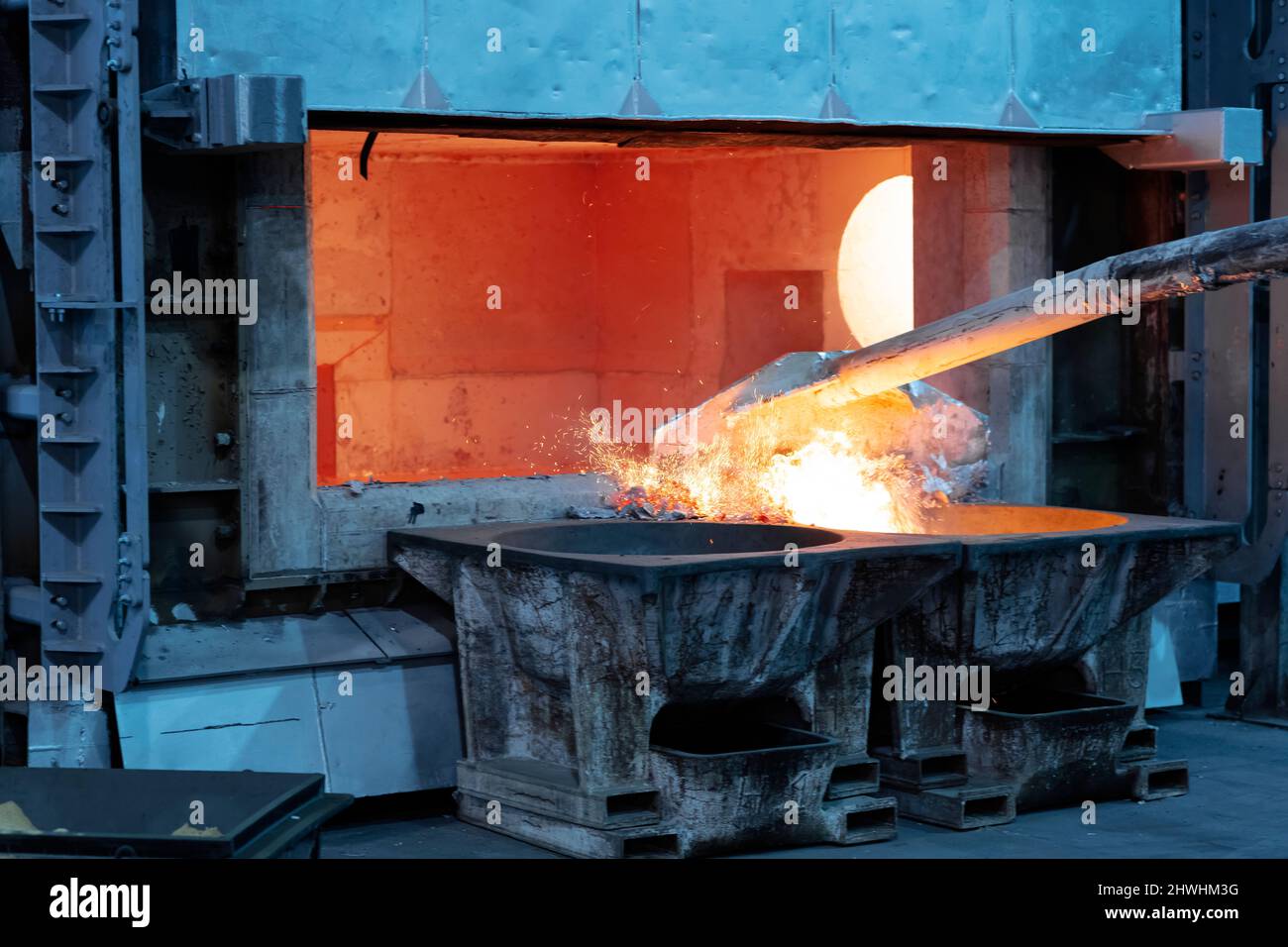Aluminum Foundry Wisconsin aids businesses with casting solutions
Recognizing the Benefits and Innovations in the Aluminum Foundry Sector
The Aluminum Foundry industry plays a vital duty in contemporary manufacturing. Its lightweight properties especially improve fuel performance, especially in aerospace and auto sectors. Furthermore, Aluminum's resistance to rust assurances durability in various applications. As the sector evolves, technologies such as advanced recycling and additive production are reshaping manufacturing methods. Discovering these developments reveals not only the benefits but additionally the obstacles ahead for Aluminum factories in a rapidly altering market.
The Lightweight Benefit of Aluminum
Aluminum's light-weight nature supplies considerable benefits across numerous industries, specifically in manufacturing and transport. Its low thickness enables for the production of elements that are simpler to mount and handle, resulting in minimized labor prices and boosted effectiveness. In the auto industry, lighter vehicles add to enhanced gas economic situation and lower exhausts, straightening with international sustainability goals. Likewise, in aerospace, the usage of Aluminum decreases the overall weight of airplane, which is important for improving performance and minimizing functional expenses.
Furthermore, Aluminum's light-weight residential properties help with ingenious layouts that were previously impractical with much heavier products. This flexibility makes it possible for suppliers to develop complex shapes and structures while preserving structural stability. On the whole, the light-weight benefit of Aluminum not only boosts product efficiency but additionally drives innovations in modern technology and layout, making it a preferred material in different applications.
Deterioration Resistance and Durability
The Aluminum Foundry industry is renowned for generating materials with superior rust resistance, making them suitable for numerous applications. This property, incorporated with improved architectural stability, adds to the lasting performance benefits that Aluminum elements use. Consequently, industries increasingly rely upon Aluminum to satisfy requiring ecological problems without endangering quality.
Superior Rust Resistance
While different steels encounter significant challenges from environmental aspects, Aluminum stands out for its remarkable corrosion resistance, making it a preferred choice in lots of applications. This home is mostly as a result of an all-natural oxide layer that creates on the Aluminum surface, offering a barrier against moisture and harsh representatives. Unlike various other metals that may rust or degrade with time, Aluminum keeps its stability even in severe environments, such as commercial setups or coastal areas. In addition, its light-weight nature integrated with rust resistance makes it suitable for applications in aerospace, vehicle, and marine industries. Overall, Aluminum's extraordinary toughness not only boosts product longevity yet likewise decreases maintenance expenses, presenting an engaging advantage for manufacturers and customers alike.
Improved Structural Honesty
Engineers and developers significantly acknowledge the importance of boosted architectural integrity in modern-day applications, where both rust resistance and sturdiness are vital. Aluminum alloys, recognized for their light-weight buildings, likewise exhibit remarkable resistance to deterioration, making them suitable for extreme environments. The ingenious strategies utilized in the Aluminum Foundry market add significantly to generating parts with improved toughness. Advanced casting processes and alloy structures are customized to fulfill particular efficiency needs, guaranteeing that frameworks can withstand severe problems without compromising honesty. Surface area therapies and layers improve the life-span of Aluminum products, additionally mitigating wear and tear over time. This concentrate on boosted architectural integrity not only expands the usability of materials yet additionally minimizes maintenance expenses, strengthening Aluminum's placement as a material of option in different sectors.
Durable Efficiency Perks
Durable efficiency in Aluminum elements is mainly connected to their premium deterioration resistance and resilience. Unlike numerous metals, Aluminum naturally creates a safety oxide layer, which protects against corrosion and damage in numerous settings, consisting of marine and industrial settings. This fundamental property considerably expands the life-span of Aluminum products, lessening maintenance and replacement expenses. Furthermore, the lightweight nature of Aluminum boosts its applicability throughout industries without endangering toughness. The material's resistance to damage likewise contributes to its integrity in requiring applications, making it an optimal option for automobile, aerospace, and construction sectors. As sectors progressively prioritize sustainability and long life, Aluminum's performance advantages line up with modern design demands, strengthening its function in ingenious manufacturing procedures.
Ecological Impact and Sustainability
 As the Aluminum Foundry industry advances, it progressively focuses on environmental effect and sustainability, identifying the need for accountable techniques in the face of climate adjustment. Initiatives to minimize waste and energy usage go to the center, with many factories embracing reusing why not try here initiatives to reclaim Aluminum scrap. This not only lowers basic material usage yet also significantly reduces energy expenditure, as recycled Aluminum needs just a fraction of the energy compared to main manufacturing.
As the Aluminum Foundry industry advances, it progressively focuses on environmental effect and sustainability, identifying the need for accountable techniques in the face of climate adjustment. Initiatives to minimize waste and energy usage go to the center, with many factories embracing reusing why not try here initiatives to reclaim Aluminum scrap. This not only lowers basic material usage yet also significantly reduces energy expenditure, as recycled Aluminum needs just a fraction of the energy compared to main manufacturing.Furthermore, innovations in emissions control innovations are being implemented to decrease air contaminants, lining up procedures with more stringent ecological regulations. Foundries are also exploring alternative energy sources, such as solar and wind, to power their facilities sustainably. By fostering cooperation with stakeholders, the sector intends to create cutting-edge options that improve environmental stewardship. Collectively, these initiatives highlight a commitment to reducing the Aluminum Foundry's carbon impact while advertising a circular economic climate within the manufacturing industry.
Advanced Manufacturing Techniques
 Revolutionizing manufacturing procedures, the Aluminum Foundry industry is significantly incorporating sophisticated manufacturing strategies to boost performance and accuracy. Techniques such as computer system numerical control (CNC) machining and additive production have actually emerged as important parts in enhancing manufacturing process. CNC machining enables high-precision element fabrication, considerably decreasing product waste and production time. At the same time, additive manufacturing opens up new methods for complicated geometries and light-weight designs that were formerly difficult to attain.
Revolutionizing manufacturing procedures, the Aluminum Foundry industry is significantly incorporating sophisticated manufacturing strategies to boost performance and accuracy. Techniques such as computer system numerical control (CNC) machining and additive production have actually emerged as important parts in enhancing manufacturing process. CNC machining enables high-precision element fabrication, considerably decreasing product waste and production time. At the same time, additive manufacturing opens up new methods for complicated geometries and light-weight designs that were formerly difficult to attain.Furthermore, the deployment of automation and robotics in Aluminum shops improves operations, minimizes human error, and improves employee security. These innovations promote a more responsive production setting, making it possible for producers to adapt swiftly to market needs. The integration of sophisticated simulation software further improves the style and screening stages, causing superior product high quality. Jointly, these techniques not only enhance functional performance but likewise foster technology, positioning the Aluminum Foundry sector at the center of modern manufacturing.
Advancements in Reusing Procedures
The Aluminum Foundry market is not only advancing in manufacturing strategies yet is likewise making considerable strides in recycling procedures. Technologies are emerging to boost the performance of reusing methods, reducing power usage and enhancing sustainability. Advanced sorting modern technologies, such as computerized optical sorting, allow the identification and splitting up of Aluminum from other materials with high accuracy. This results in a better of recycled Aluminum, which is crucial for preserving the stability of the final items.
Closed-loop recycling systems are being applied, permitting producers to recycle Aluminum scrap within their own manufacturing processes. This minimizes waste and advertises a circular economic climate. Additionally, study into brand-new recycling methods, such as hydrometallurgical procedures, provides the possibility for recovering Aluminum from intricate waste streams. These developments not just add to lowering the carbon footprint of the Aluminum Foundry sector but additionally reinforce its financial viability in a significantly environmentally mindful market.
Applications Throughout Various Industries
Countless industries are progressively recognizing the adaptability and advantages of Aluminum Foundry products, causing widespread applications across sectors such as automobile, building, aerospace, and customer goods. In the auto sector, Aluminum spreadings contribute to lightweight vehicle styles, enhancing fuel effectiveness and efficiency. Aerospace manufacturers utilize Aluminum elements for their strength-to-weight ratio, crucial for airplane frameworks and components.
In construction, Aluminum is favored for its toughness and resistance to deterioration, making it ideal for window frames, roofing, and structural supports. Durable goods likewise take advantage of Aluminum Foundry products, as seen in kitchenware, electronic devices, and product packaging, where light-weight and recyclable materials are important.
The flexibility of Aluminum Foundry techniques enables for accurate requirements and complex layouts, accommodating the varied requirements of these markets. As a result, Aluminum Foundry products are coming to be indispensable to modern-day production procedures across various sectors.
Future Trends in Aluminum Foundries
As learn this here now sectors remain to progress, Aluminum foundries are positioned to welcome a number of essential trends that assure to improve efficiency and sustainability. One prominent fad is the raising fostering of digital modern technologies, consisting of automation and man-made intelligence, which streamline procedures and enhance quality assurance. In addition, the press in the direction of sustainable practices is visit this site leading shops to buy reusing innovations, greatly lowering waste and energy intake.
 Another arising fad is using innovative alloys and materials, satisfying the growing demand for light-weight and durable elements throughout various industries (Aluminum Foundry). In addition, the integration of additive production strategies is anticipated to reinvent component design, providing modification and reducing lead times
Another arising fad is using innovative alloys and materials, satisfying the growing demand for light-weight and durable elements throughout various industries (Aluminum Foundry). In addition, the integration of additive production strategies is anticipated to reinvent component design, providing modification and reducing lead timesPartnership with research study establishments is also anticipated to drive innovation, as factories seek to establish brand-new procedures and products. Aluminum Foundry. Jointly, these fads show a transformative future for the Aluminum Foundry sector, aligning with broader goals of sustainability and effectiveness
Often Asked Concerns
What Are the Normal Prices Related To Aluminum Foundry Manufacturing?
The typical costs associated with Aluminum Foundry manufacturing include basic materials, labor, energy, devices maintenance, and overhead expenses. These aspects collectively affect the overall financial investment needed for reliable Aluminum spreading procedures.
Exactly How Does Aluminum Compare to Other Metals in Strength?
Aluminum, while lighter than several steels, shows excellent strength-to-weight proportions. Compared to steel, Aluminum is less solid yet uses exceptional rust resistance, making it a positive option in applications where weight and toughness are necessary.
What Precaution Are in Place in Aluminum Foundries?
Safety and security procedures in Aluminum factories usually include required individual protective tools, air flow systems to control fumes, normal devices maintenance, training programs for employees, and adherence to stringent security policies to decrease dangers connected with liquified metal handling.
Just How Is Quality Assurance Managed in Aluminum Casting Processes?
Quality assurance in Aluminum casting procedures involves strenuous assessments at various phases, including resources assessment, procedure monitoring, and last product screening. Techniques such as analytical process control and non-destructive testing warranty adherence to market criteria.
What Accreditations Are Very Important for Aluminum Foundry Distributors?
The significance of certifications for Aluminum Foundry vendors includes ISO 9001 for high quality monitoring, ISO 14001 for environmental monitoring, and industry-specific criteria like ASTM and SAE, guaranteeing conformity, safety, and dependability in making processes.
The Aluminum Foundry market plays an important function in modern manufacturing. The Aluminum Foundry sector is renowned for producing materials with remarkable deterioration resistance, making them perfect for different applications. Changing production processes, the Aluminum Foundry market is progressively incorporating innovative manufacturing techniques to improve effectiveness and accuracy. The Aluminum Foundry sector is not just advancing in manufacturing methods however is likewise making substantial strides in recycling processes. As industries continue to progress, Aluminum factories are poised to accept a number of crucial fads that assure to boost performance and sustainability.